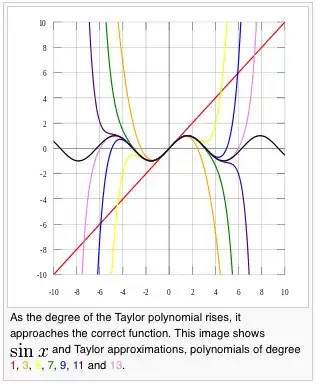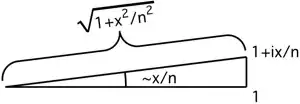I'm with you on the infinite series thing. I find it perfectly rigorous, but unimpressive from an intuitive point of view.
Here's yet another way to think about $e^z$, which may or may not help you.
We can think of the exponential function $\exp : R \rightarrow R$ as the unique analytic function with the following properties:
$$\exp(0) = 1$$
$$\frac{d}{dx}\exp(x) = \exp(x)$$
You do need a bit of calculus to show that the function exists and is unique. You can prove this if you wish, or we can just take it as read.
Is there an obvious way to extend this function to the complex plane?
We will assume that $\exp(ix)$ is a complex-valued function. We will introduce two real-valued functions to represent the real and imaginary parts:
$$c : R \rightarrow R$$
$$s : R \rightarrow R$$
$$\exp(ix) = c(x) + i s(x)$$
Of course we know the reason for calling them $c$ and $s$, but let's pretend we don't, and just assume they're analytic functions, and see what we can find out about them.
Setting $x=0$ gives:
$$c(0) = 1$$
$$s(0) = 0$$
So far, so good. We would also like to preserve the property:
$$\frac{d}{dx}\exp(x) = \exp(x)$$
That is:
$$c(x) + i s(x) = \exp(ix) = i \exp'(ix) = i c'(x) + i^2 s'(x) = - s'(x) + i c'(x)$$
Note that again, no additional properties of $\exp$ are assumed beyond those we already gave. The second step uses the chain rule, but this is okay because we assumed $\exp$ was analytic.
Matching up real and imaginary components gives:
$$c(x) = - s'(x)$$
$$s(x) = c'(x)$$
So we have a coupled system of differential equations, and we also have initial conditions at $x=0$. Again, you need some calculus to show that $c$ and $s$ exist and are unique. The solution, of course, turns out to be $c(x) = \cos x$ and $s(x) = \sin x$.
One last thing you should know.
The exponential identity is useful for deriving almost every trigonometric identity that you will ever need. That, and Pythagoras' theorem ($\cos^2 \theta + \sin^2 \theta = 1$).
Suppose, for example, you need a formula for $\sin (a+b)$. Then:
$$\cos (a+b) + i \sin(a+b) = e^{i(a+b)} = e^{ia} e^{ib}$$
$$= ( \cos a + i \sin a ) (\cos b + i \sin b )$$
$$= \cos a \cos b + i \cos a \sin b + i \sin a \cos b - \sin a \sin b$$
$$= (\cos a \cos b - \sin a \sin b) + i (\cos a \sin b + \sin a \cos b)$$
Matching up real and imaginary parts gives:
$$\cos (a+b) = \cos a \cos b - \sin a \sin b$$
$$\sin (a+b) = \cos a \sin b + \sin a \cos b$$


